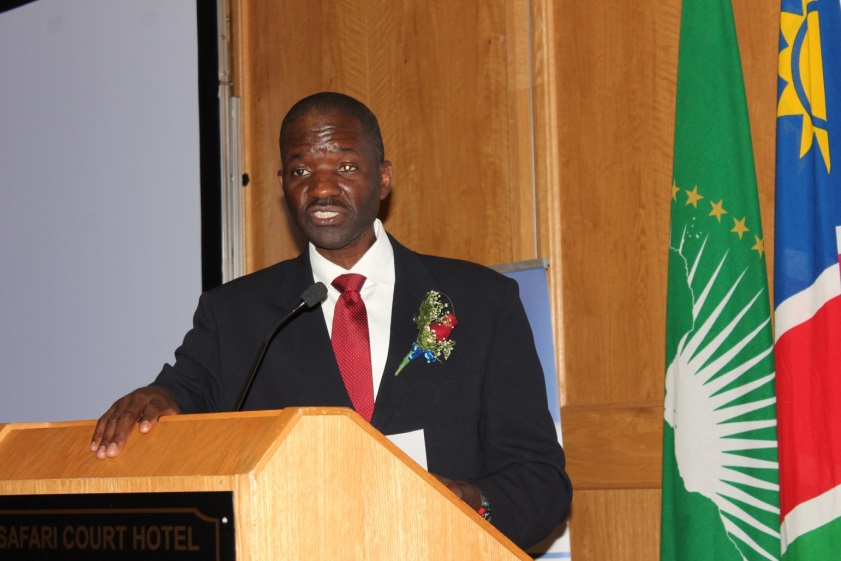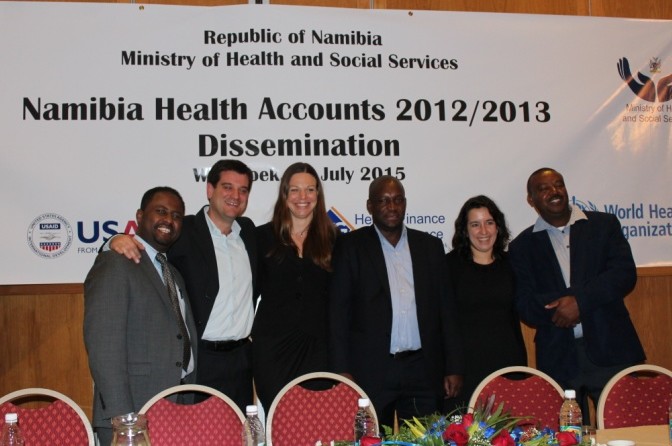Championing Sustainability, Namibia Funds Health Accounts

Namibia’s Minister of Health, Dr. Benhard Haufiku, shares remarks about the importance of Health Accounts data to inform health policy decisions.
In Namibia, donor funding for health dropped by 47 percent between 2009 and 2013. This sharp decline could have broad implications for the health sector—particularly Namibia’s HIV and AIDS response which relies heavily on donor resources.
In light of declining donor resources for health, the Government of Namibia (GRN) is positioning itself to sustain health sector progress to-date, through investing in Health Accounts. Health Accounts —an internationally standardized methodology that allows a country to understand the source, magnitude, and flow of funds through its health sector—is a key tool to better understand a country’s health financing landscape.
With the support of USAID’s HFG project, the GRN completed its fourth round of Health Accounts covering the 2012/13 fiscal year. For the first time, the GRN committed funds in addition to its historical allocation of staff time to conduct the exercise. The additional N$1,000,000 (US$80,000) from the GRN’s annual budget helped fund the local costs associated with data collection and analysis.
Since 1998, the GRN has completed four rounds of Health Accounts. Previously, the exercises were only conducted when funds were allocated by donors or implementing agencies – typically every few years. Conducting an annual Health Accounts exercise is far more valuable in providing a full picture of health financing trends. USAID assistance thought HFG and its predecessor, Health Systems 20/20, has supported the past three rounds of Health Accounts, which have helped the GRN recognize their importance for informing health policy decisions. This round, the government committed funds to the exercise, championing Health Accounts as an important tool for making evidence-based health policy decisions
Building Capacity to Inform the Future
In most countries, institutionalization or the routine production and use of health accounts data is a challenge and Namibia is no exception. Through training on the SHA 2011 methodology, technical assistance, and additional support, HFG helped the GRN build in-country capacity to produce Health Accounts on a regular basis. HFG and the Ministry of Health and Social Services (MoHSS) Health Accounts team also explored other mechanisms to ensure regular production of Health Accounts in the future.

HFG team members and the Ministry’s Health Accounts leads at the dissemination of the 2012/13 results.
The finalization of the current Health Accounts results has garnered excitement and momentum in Namibia. The Minister of Health and Social Services, Dr. Benhard Haufiku, disseminated the Health Accounts results at a launch event in Windhoek in July 2015.
Dr. Haufiku emphasized the importance of the exercise, stating: “National Health Accounts …provides critical information required for strategic and informed decision-making at various levels of the Ministry and by other relevant stakeholders.” He also expressed enthusiasm and commitment to regularizing Health Accounts: “We look forward to conducting Health Accounts exercises on a regular basis and institutionalizing the process within [the Ministry] so that we can continue to track health financing progress and continue to make data-driven and evidence-based decisions.”
The Ministry’s Health Accounts team is eager to begin the next round covering the 2014/15 financial year. The team is proactively identifying more efficient data collection processes, and securing greater involvement of key stakeholders in order to produce improved results in a shorter time frame. These are important steps towards country ownership of the Health Accounts process and ensuring that results are produced and used on a regular basis.
Namibia’s continued investment in Health Accounts bodes well for the sustainability of the country’s health system. The additional domestic funding for the fourth round of Health Accounts signals recognition of the importance of collecting the data and using it to inform national health care decisions. As donor funding declines further, it is imperative that countries step up with domestic resources to fund these crucial exercises.
Download in PDFLearn more about HFG’s work in Namibia



